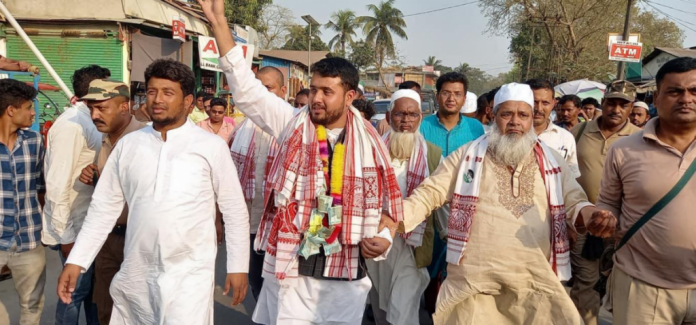
The 27-year-old is the youngest representative in the Assam legislative assembly following his victory over incumbent and former Congress minister Sukur Ali Ahmed from Barpeta district’s Chenga constituency in the recently announced state election results.
Mahibul Hoque, TwoCircles.net
Guwahati: In Assam, what do you get when you write a poem in your dialect highlighting the injustices and sufferings of your people? Sedition charges!
The “my mother is D-voter” sentence may attract the wrath of the dominant group of Assam, but for the subaltern of state, it provides solace and eventually leads them to choose a victor in the next state assembly elections.
Ashraful Hussain, a rookie, is an anti-Citizenship Amendment Act (CAA) activist and fierce Miya poet who has faced sedition charges for his protest poem.
He left his corporate job to come back to Haripur, a small village around 80 kilometres west from Guwahati, and work for his community since 2016.
His engagement at the grassroots level prompted the voters of his constituency to ask him to contest ensuing assembly elections in Assam. People crowd-sourced resources such as rice, daal, tents apart from money to execute his electoral campaigns, a bottom-up election process.
The 27-year-old is the youngest representative in the Assam legislative assembly following his victory over incumbent and former Congress minister Sukur Ali Ahmed from Barpeta district’s Chenga constituency in the recently announced state election results.
Ashraful, contesting with a Badar Uddin Ajmal’s All India United Democratic Front of Assam (AIUDF) ticket, garnered 75312 (58.83 per cent) votes to come on the top, way ahead of rivals from Assam Gana Parishad (AGP) candidate Rabiul Hussain and Congress veteran Sukur Ali Ahmed who got 23373 and 22573 votes respectively.
He is among the ten Miya poets who were booked for sedition. Miya poems took the socio-political environment of the state by storm when people started to write down the sufferings of the socially marginalised community.
Ashraful’s victory is significant for the political environment of Assam as his campaign focused on diametrically opposite issues than that of the populist sentiments of Assamese. One of his campaign posters read, ‘The D-voter issue has become like cancer in contemporary times’. In popular Assamese narrative, however, D-voter is a mechanism to deal with the ‘illegal immigration from Bangladesh’ to ‘protest the indigenous people’ of the state.
D-voter or doubtful voters or dubious voters is a category in the electoral roll of Assam to disenfranchise voters allegedly for their lack of documentary proof of their Indian citizenship.
On his social media page during the campaign, he wrote, ‘Those who ripped off everyone by the D-Voter problem, my aim objective is to salvage them from this cancer like disease’ along with his resolute stance in assisting to get every eligible citizen enrolled in the National Register of Citizens (NRC) paved the way for his electoral success.
While the ruling Bharatiya Janata Party (BJP) and its stalwart Himanta Biswa Sarma carried out their election campaign on polarisation, Ashraful’s grassroots connection with the impoverished marginalised paid the dividends.
It has been his relentless work towards the community during the NRC update process, issue of child marriage, D-voter and helping migrants during the lockdown announced following the first wave of Covid-19 infections that made him a public face.
“When overnight notices for hearings in far-flung parts of Assam were served to people of our district, he rose to help them. From arranging buses to carry them to Upper Assam districts, boats to ferry people to the buses, to arranging food in Upper Assam districts, we worked together to get people to attend the re-verification process hundreds of kilometres away from our place,” said a fellow Miya protest poet who did not wish to be named.
It was the desire to work for the community which made him leave his job, which he got due to his mechanical engineering diploma, and return to his village from Maharashtra. Once back in his home, he found himself amid the NRC chaos. With the resolution to serve the people, he initiated village to village campaign to train people about the verification process, filling forms, and appearing in the hearings of NRC.
During the NRC update process, he along with his friends made sure that the elderly women, widows, and labourers get to attend the verifications notified repeatedly by the NRC authority.
Engrossed in social activism, he became the reach-out person for the masses from within the Barpeta district as well as outside of the district. This reflected when migrant labour from various parts of the state and the country started calling to get them back home during the lockdown.
“He ran donation drives, arranged buses to bring many of the migrant labourers,” said the fellow Miya poet.
Just after his return to Assam in 2016, he would reach out to the victims of evictions led by the BJP government in minority areas. He raised food, clothing and money for the evicted families in Darrang and Dhubri districts.
During his election campaign, he rallied on the promise of land rights for the people of char (riverine sandbanks) areas of Assam. The land policy of Assam, introduced in 2019 by the BJP, affect the community largely as it potentially leaves the community from gaining land rights of their ancestral land. He has also promised to get an adequate number of teachers against students in schools as a high teacher-student ratio ail education in minority areas of Assam, as well.
Abdul Kalam Azad, a PhD candidate at Amsterdam University and social activist told TwoCircles.net, “His win will change the fate of Miya politics in Assam. He is brave, unapologetic, deeply committed to the people he represents and a strong believer in constitutional ethos. Unlike others, he is expected to fight for the dignity of his people. This will bring a paradigm shift in the political narratives about Miya Muslims of Assam.”

